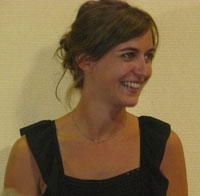Postdoctoral Associates
 |
Florie BorelPostdoctoral Associate since 2012
|
Education
2012 PhD in Biomedicine, University of Amsterdam, Amsterdam, The Netherlands; "RNAi-based gene therapy of hepatocellular carcinoma: targeting ABC transporters"; advisors: Prof Peter LM Jansen, Prof Sander JH van Deventer, Dr Pavlina Konstantinova
2006 MSc in Molecular Biology, University of Montpellier II, Montpellier, France and Utrecht University, Utrecht, The Netherlands
2004 BSc in Biology, University of Montpellier II, Montpellier, France
Research interests
Translational research, AAV-mediated gene transfer and gene silencing, RNAi therapeutics, liver diseases, neurodegenerative diseases, alpha-one antitrypsin deficiency
Project
I work on several aspects of alpha-one antitrypsin deficiency (AATD). We recently developed the first mouse model of AATD lung disease, and showed that it develops emphysema with age. This model will be crucial in the development of new therapeutics such as gene therapy and genome editing. Another of my projects is to develop strategies to improve the clinical AAV1-CB-AAT vector in order to get higher serum levels. Making the clinical vector more potent will allow for a reduced vector dose in the clinic. We are about to test our best candidates in primates. We will also test our proprietary dual function vector – that allows Z-AAT knockdown and M-AAT augmentation – in primates.
Besides AATD, I also work on SOD1-linked ALS. Our lab developed an artificial miRNA to silence SOD1. We have generated proof-of-concept in post-symptomatic, adult SOD1G93A mice: treatment with our vector delays disease onset, maintains muscle strength, motor function, and ventilation, and it improves survival. We have also shown that this treatment is translatable to primates. We are doing further studies in primates to optimize our delivery protocol and pave the way towards the clinic.
 |
Gwladys GernouxPostdoctoral Associate since 2014
|
Education
2013 PhD in Biology, College of Medicine, Nantes, France; "AAV-based gene transfer in skeletal muscle: impact of vector delivery methods on host immune system", Advisors: Dr Philippe Moullier, Dr Oumeya Adjali
2009 MSc in Biology, College of Medicine, Paris XII, France
2007 BSc in Biology and Biochemistry, College of Sciences and Technological Sciences, Nantes, France
Research interests
Gene transfer, immunology, translational research, molecular biology, viral vectors
Project
Immune responses against AAV capsids are not fully understood in at least one instance in a clinical trial for liver gene transfer where the capsids elicited cytotoxic lymphocyte (CTL) responses leading to clearance of transduce hepatocytes. On the other hand in clinical trials with AAV delivery to the muscle, capsids elicited a regulatory T-cell response leading to sustained stable expression in patients for more than 3 years. My project will be to characterize what type of immune response is elicited against an AAV capsid after CNS delivery. Also I will be looking at the innate and adaptive responses to AAV in the CNS and the impact this may have on gene transfer and AAV re-administration as well as the persistence of intact capsids and capsid epitopes after rAAV delivery. In collaboration with the Flotte lab I will also further characterize regulatory T-cell response to AAV capsid in future clinical trials with rAAV1 for alpha-1 antitrypsin.
Abbas AbdallahPostdoctoral Associate since 2016
|
|
Education
2014 PhD in Biology, Purdue University, West Lafayette, Indiana
2008 BSc in Biology, Lebanese American University, Beirut, Lebanon
Research interests
C9orf72-linked ALS, genome editing
Project
Genome editing for C9orf79-linked ALS and novel genome editing methods
